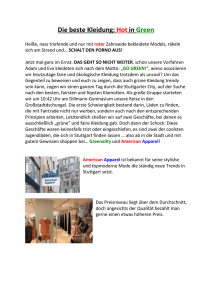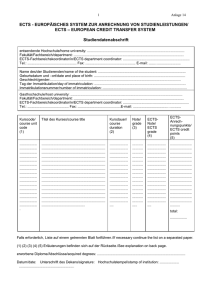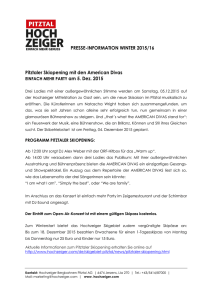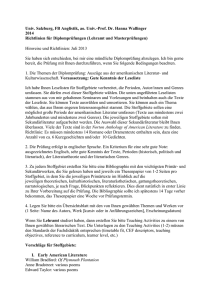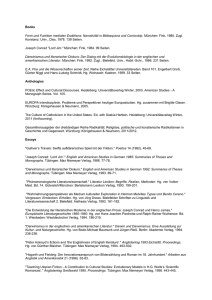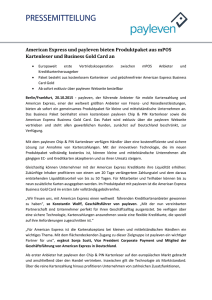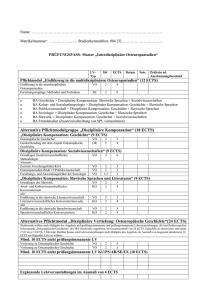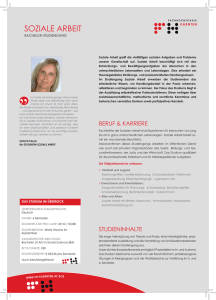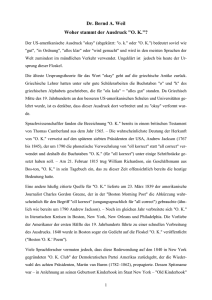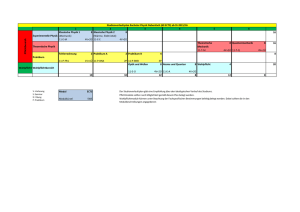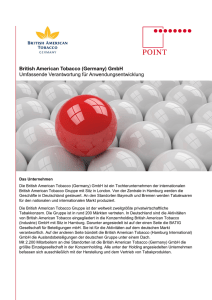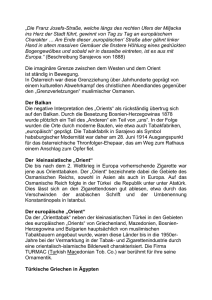Wintersemester 2009/10 - Amerika
Werbung
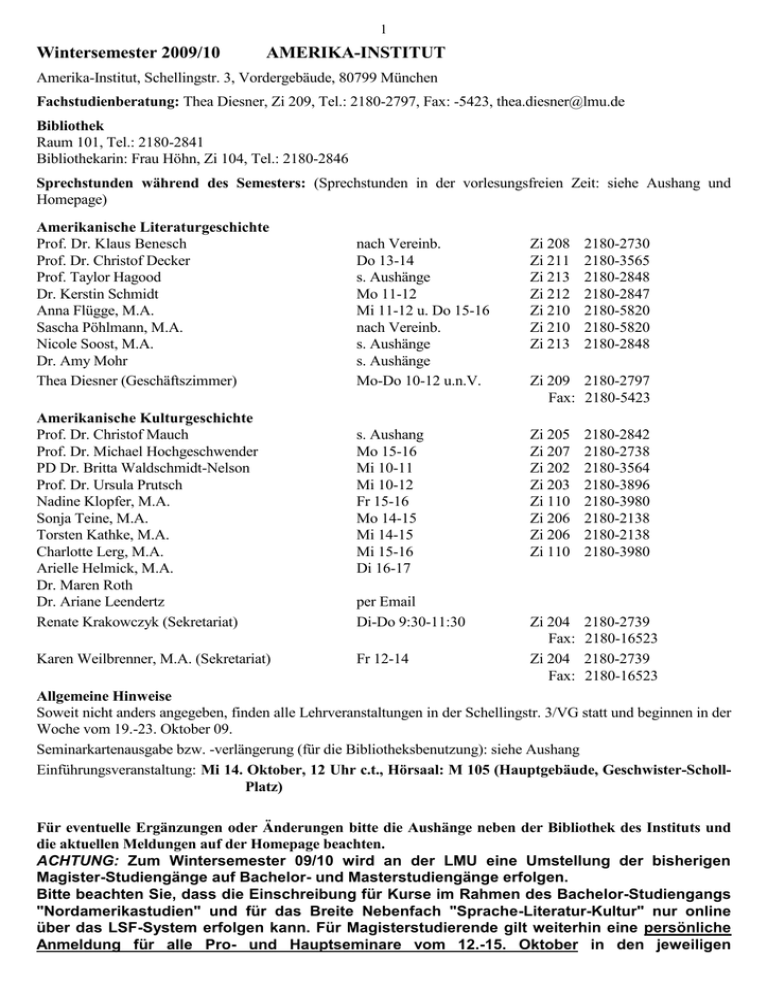
1 Wintersemester 2009/10 AMERIKA-INSTITUT Amerika-Institut, Schellingstr. 3, Vordergebäude, 80799 München Fachstudienberatung: Thea Diesner, Zi 209, Tel.: 2180-2797, Fax: -5423, [email protected] Bibliothek Raum 101, Tel.: 2180-2841 Bibliothekarin: Frau Höhn, Zi 104, Tel.: 2180-2846 Sprechstunden während des Semesters: (Sprechstunden in der vorlesungsfreien Zeit: siehe Aushang und Homepage) Amerikanische Literaturgeschichte Prof. Dr. Klaus Benesch Prof. Dr. Christof Decker Prof. Taylor Hagood Dr. Kerstin Schmidt Anna Flügge, M.A. Sascha Pöhlmann, M.A. Nicole Soost, M.A. Dr. Amy Mohr Thea Diesner (Geschäftszimmer) Amerikanische Kulturgeschichte Prof. Dr. Christof Mauch Prof. Dr. Michael Hochgeschwender PD Dr. Britta Waldschmidt-Nelson Prof. Dr. Ursula Prutsch Nadine Klopfer, M.A. Sonja Teine, M.A. Torsten Kathke, M.A. Charlotte Lerg, M.A. Arielle Helmick, M.A. Dr. Maren Roth Dr. Ariane Leendertz Renate Krakowczyk (Sekretariat) Karen Weilbrenner, M.A. (Sekretariat) nach Vereinb. Do 13-14 s. Aushänge Mo 11-12 Mi 11-12 u. Do 15-16 nach Vereinb. s. Aushänge s. Aushänge Mo-Do 10-12 u.n.V. Zi 208 Zi 211 Zi 213 Zi 212 Zi 210 Zi 210 Zi 213 s. Aushang Mo 15-16 Mi 10-11 Mi 10-12 Fr 15-16 Mo 14-15 Mi 14-15 Mi 15-16 Di 16-17 Zi 205 Zi 207 Zi 202 Zi 203 Zi 110 Zi 206 Zi 206 Zi 110 2180-2842 2180-2738 2180-3564 2180-3896 2180-3980 2180-2138 2180-2138 2180-3980 Zi 204 Fax: Zi 204 Fax: 2180-2739 2180-16523 2180-2739 2180-16523 per Email Di-Do 9:30-11:30 Fr 12-14 2180-2730 2180-3565 2180-2848 2180-2847 2180-5820 2180-5820 2180-2848 Zi 209 2180-2797 Fax: 2180-5423 Allgemeine Hinweise Soweit nicht anders angegeben, finden alle Lehrveranstaltungen in der Schellingstr. 3/VG statt und beginnen in der Woche vom 19.-23. Oktober 09. Seminarkartenausgabe bzw. -verlängerung (für die Bibliotheksbenutzung): siehe Aushang Einführungsveranstaltung: Mi 14. Oktober, 12 Uhr c.t., Hörsaal: M 105 (Hauptgebäude, Geschwister-SchollPlatz) Für eventuelle Ergänzungen oder Änderungen bitte die Aushänge neben der Bibliothek des Instituts und die aktuellen Meldungen auf der Homepage beachten. ACHTUNG: Zum Wintersemester 09/10 wird an der LMU eine Umstellung der bisherigen Magister-Studiengänge auf Bachelor- und Masterstudiengänge erfolgen. Bitte beachten Sie, dass die Einschreibung für Kurse im Rahmen des Bachelor-Studiengangs "Nordamerikastudien" und für das Breite Nebenfach "Sprache-Literatur-Kultur" nur online über das LSF-System erfolgen kann. Für Magisterstudierende gilt weiterhin eine persönliche Anmeldung für alle Pro- und Hauptseminare vom 12.-15. Oktober in den jeweiligen 2 Sekretariaten (zu den Sprechzeiten). Ohne diese Anmeldung ist keine Seminarteilnahme möglich! Magister-Studenten, die noch einen Grundkurs-Schein erwerben wollen, müssen sich ebenfalls online anmelden. Für Studierende, die noch im Magisterstudiengang "Amerikanische Kulturgeschichte" oder "Amerikanische Literaturgeschichte" eingeschrieben sind, werden auch in Zukunft die entsprechenden Kurse angeboten! A. SPRACHTEST Sprachtest – C-Test: Donnerstag, 30. Juli 2009, 9:00 – 13:00, Raum 420a (Multimedia-Sprachlabor), Schellingstr. 3/VG, 4. Stock. Bitte Personalausweis mitbringen. Anmeldung per e-mail an: [email protected] (unter Angabe von Namen, Geburtsdatum, ggf. Matrikel-Nr. sowie Fächerkombination). Wir empfehlen allen B.A.-Studienanfängern, den C-Test zu absolvieren. Falls er mit mind. 65 Punkten bestanden wird, kann er als Leistung im Basismodul 2 "Sprachkompetenz" angerechnet werden. B. Bachelor "Nordamerikastudien" Grundkurse, Übungen und Vorlesungen: Prof. Dr. Ursula Prutsch/N.N.: Grundkurs I: Einführung in die Amerikanische Kulturgeschichte (ECTS 3), Mi, 8:30-10, Hörsaal: S 004 (E04) Grundkurs I covers American social, political, and cultural history from colonial times to the end of Reconstruction (1492-1890). The historical background knowledge from this class serves as the foundation for the entire American Cultural History program. The class will expand, enlarge and comment on the information found in the textbook. For each session about one chapter of the textbook must be read and prepared. There will be a midterm and final examination. Registration is needed. Textbook: Mary Beth Norton et al. A People and a Nation: A History of the United States. 8th edition. Boston: Houghton Mifflin, 2007 (6th through 7th edition also ok). Prof. Dr. Christof Decker: Grundkurs I: Einführung in die Amerikanische Literaturwissenschaft (ECTS 3), Do 10-12, Hörsaal: S 006 (E06). Der Einführungskurs vermittelt literatur- und medienwissenschaftliche Grundlagen. Im Zentrum stehen Fragen der Analyse, Methodik, Interpretation und Theorie, die an Texten aus den Bereichen Prosa, Lyrik und Drama sowie an audiovisuellen Beispielen erläutert werden. Der Kurs ist obligatorisch für den BA-Studiengang "Nordamerikastudien". Nicole Soost/Tina Lorenz: Übung zum Grundkurs I Literaturgeschichte (ECTS 3), Mo 11-13 und Di 10-12, Räume 105 und 201. Die Übung vertieft und erweitert den Stoff der Grundkurs I-Vorlesung in kleineren Gruppen und anhand weiterführender Beispiele. Sie ist obligatorisch für den BA-Studiengang "Nordamerikastudien" und kann nur in Verbindung mit der Grundkurs I-Vorlesung (Einführung in die Literaturwissenschaft) besucht werden. Prof. Dr. Ursula Prutsch: Englisch- und deutschsprachige Einwanderung nach Amerika (17. – 19. Jhdt) (ECTS 3), Mo 9-11, Raum 105 Die Übung bietet – begleitend zum Grundkurs – eine Einführung in die Interpretation und Analyse unterschiedlicher historischer Text- und Bilddokumente (Berichte, Briefe, Tagebücher, Biographien, Zeichnungen, Karikaturen) sowie Filme zur Geschichte englischer und deutscher Auswanderung nach "Amerika". In der Übung werden Zeitzeugenberichte des 17. Jahrhunderts ebenso analysiert wie Auswanderungspropaganda des 19. Jahrhunderts und filmische Verarbeitungen des Themas (wie etwa Terrence Malicks Film "The New World"). Anhand der Quellen soll auch das Spannungsfeld zwischen historischer "Wahrheit" und Fiktion diskutiert werden. Prof. Dr. Ursula Prutsch: Manifest Destiny. Die expansionistische Politik der USA von 1835 bis 1893 (ECTS 3), Do 12-14, Raum 106 Das Ziel dieser, den Grundkurs begleitenden und vertiefenden, Übung ist es, die theoretischen Konzepte, politischen Strategien und die Organisation der Expansion nach Westen und Süden (über die Grenzen der USA hinaus) anhand ausgewählter Quellen zu diskutieren: Zunächst wird die Bedeutung der Konzepte "Manifest Destiny" und "American Exceptionalism", des rassistischen Superioritätsdenkens weißer Eliten und Jackson Turners "frontier"-These (1893) erarbeitet. Als Beispiele expansionistischer Politik dienen einerseits die Besiedlung des Westens und die Vertreibung der indigenen Bevölkerung, andererseits die außenpolitischen 3 Interessen und Interventionen der USA in Mexiko, Kuba und Nicaragua. Dabei sollen auch Quellen zur Wahrnehmung der US-Politik aus deren Sicht berücksichtigt werden. Charlotte Lerg, M.A.: Images of American History (ECTS 3), Do 8:30-10, Raum 201 The course accompanies the Grundkurs focusing on visual culture. The aim is to gather the importance of images for the understanding of past societies. The class will start with an introduction into the method of dealing with pictorial sources and then, using a selection of examples like cartoons, paintings and prints or physical objects and films, we will consider how these sources provide us with vital clues about the past. Charlotte Lerg, M.A.: Living in a New Nation – Biographies of the Early Republic (ECTS 3), Mi 16-18, Raum 105 This class will approach early American History through the eyes of contemporaries by looking at various biographies. The examples will go beyond the typical "great white men" and also ask what we can know about the lives of artisans, women or slaves. The aim is to gain some insight into the method of approaching biographies as an academic genre and to understand how historical events were reflected in people’s lives. Arielle Helmick, M.A.: Television and American Culture, Part II (ECTS 3), Di 8:30-10, Raum 201 The Idiot Box, the Boob Tube – despite the negative nicknames, television has played an essential role in American culture during the last 75 years. This course will examine how both television and American culture have changed as a result of the other. Moving chronologically, each session will look at different TV trends and genres, focusing on how the portrayals of “normal life,” as well as race, class and gender have changed over time. In addition to watching and analyzing television shows, we will also discuss some TV theory. This course, part II, will focus on TV history from 1980 to 2009. This course will provide an important background for anyone considering a master’s thesis dealing with television shows. Arielle Helmick, M.A.: American Pop (ECTS 3), Mo 18-20, Raum 201 How have Elvis, Bridget Jones, Homer Simpson, Marilyn Monroe and Betty Crocker shaped American popular culture? Furthermore, are these pop culture icons even worthy of academic study? This class will examine the history and theory of five major areas of popular culture in the U.S.A.: music, film, television, literature and advertising. By looking at the fads and flops in American popular culture since World War II, we will analyze how popular culture has influenced (and been influenced by) politics, censorship, social policy – and how popular culture itself functions as an incredibly valuable source for American studies. Arielle Helmick, M.A.: Green Pop: Environmentalism and American Popular Music (ECTS 3), Di 18-20, Raum 201 From the first “green” pop song, “Woodman, Spare that Tree!” (1830), pop music has had an important role in various environmental movements in the U.S.A. How has “green pop” reflected changes in the American attitudes (and policies) towards the environment? Has a “green pop” song actually spurred a major policy change or environmental movement? How closely has “green pop” worked with other aspects of the popular culture environmental movement – public service announcements, films, etc.? The course will chronologically follow the interaction between environmentalism and music in the U.S.A, focusing on major songs and movements and how they have worked together. Dr. Meike Zwingenberger: Urban Life in Colonial America and the New Nation (ECTS 3), Do 8:30-10, Raum 106 This course will take a look at the inspiring topic of the city in American history. It offers a survey of urban life in colonial America and the new nation through lectures, films, guest speakers, discussions of first hand accounts and analyses by historians. You will learn how to retrieve and use primary and secondary source material required for assignments in this class. We will also discuss the development of U.S. cities in the 19th, 20th and 21st century and cover new perspectives on American Urban History. Dr. Nina Weißer: Die Geschichte der amerikanischen Außenpolitik von der Unabhängigkeit (1776) bis zum Krieg gegen den Terrorismus (2001) (ECTS 3), Blockseminar im November/Dezember 09. Termine: Mi 21.10., 12-13 Uhr (Einführung); Sa, 7.11.; So, 8.11.; Sa, 12.12.; So, 13.12., jeweils 10-16:30 Uhr, Raum 105 Diese Übung soll einen Überblick über die Geschichte der amerikanischen Außenpolitik von den Anfängen der USA bis in die Gegenwart vermitteln. Dabei wird sowohl auf die theoretischen Grundlagen der einzelnen Phasen der amerikanischen Außenpolitik als auch auf die konkrete Umsetzung dieser Konzepte unter den einzelnen Präsidenten eingegangen. Dieser Einblick soll durch das Vorstellen eines einschlägigen Quellentextes und die anschließende Diskussion vertieft werden. 4 Soost/Lerg/Höhn: Übung zur Schlüsselqualifikation "Recherche" (ECTS 3), Mo 14-16, Di 14-16, Do 14-16, Raum F 002 (Universiätsbibliothek) Anne-Marie Hodges, M.A.: General Language Course (ECTS 3), Mo 16-18 und Mi 16-18, Raum 201 Dieser Sprachkurs ist Bestandteil des Basismoduls P2 "Sprachkompetenz" und Pflicht für diejenigen Studierenden, die den C-Test entweder nicht absolviert oder nicht bestanden haben. Prof. Dr. Michael Hochgeschwender: Historische Lebenswelten in den USA und Kanada: Eine Kulturanthropologie des nordamerikanischen Raums I, (ECTS 3), Di 10-12, Hörsaal: S 004 (E04) In dieser auf zwei Semester angelegten Vorlesung werden zum einen die theoretischen und methodischen Grundlagen der Kulturanthropologie, vor allem mit Blick auf ihre Bedeutung für die Geschichtswissenschaften (in Gestalt einer Historischen Anthropologie) behandelt. Zum anderen soll das inhaltliche Spektrum kulturanthropologischer Fragestellungen für die Nordamerikanische Geschichte breit ausgeführt werden: Von der Sexualität, der Zeugung, über Geburt, Kindheit, Jugend, Ausbildung, Berufsleben, Freizeitgestaltung bis hin zu Krankheit, Sterben und Tod. Den zeitlichen Schwerpunkt bilden die Jahrzehnte von 1770 bis 1970. Prof. Taylor Hagood: African American Literature (ECTS 3), Mi 10-12, Hörsaal: S 007 (E07). This lecture class will cover the sweep of African American writing beginning with colonial-era poet Phyllis Wheatley, proceeding through slave narratives and post-Reconstruction writing into the Harlem Renaissance and Black Arts movement of the twentieth century and concluding with contemporary work by Toni Morrison, Nikki Giovanni, Yusef Komunyakaa, and Ernest Gaines. Assigned readings will include excerpts and short works by Charles Chesnutt, W.E.B. Du Bois, Richard Wright, and Lorraine Hansberry, as well as writings by lesser known authors such as Georgia Douglas Johnson, May Miller, and Marita Bonner. C. Magister "AMERIKANISCHE KULTURGESCHICHTE" Grundkurse, Vorlesungen und Übungen: Prof. Dr. Ursula Prutsch/N.N.: Grundkurs I: Einführung in die Amerikanische Kulturgeschichte (ECTS 3), Mi, 8:30-10, Hörsaal: S 004 (E04). Grundkurs I covers American social, political, and cultural history from colonial times to the end of Reconstruction (1492-1890). The historical background knowledge from this class serves as the foundation for the entire American Cultural History program. The class will expand, enlarge and comment on the information found in the textbook. For each session about one chapter of the textbook must be read and prepared. There will be a midterm and final examination. Registration is needed. Textbook: Mary Beth Norton et al. A People and a Nation: A History of the United States. 8th edition. Boston: Houghton Mifflin, 2007 (6th through 7th edition also ok). Prof. Dr. Michael Hochgeschwender: Historische Lebenswelten in den USA und Kanada: Eine Kulturanthropologie des nordamerikanischen Raums I, (ECTS 3), Di 10-12, Hörsaal: S 004 (E04) In dieser auf zwei Semester angelegten Vorlesung werden zum einen die theoretischen und methodischen Grundlagen der Kulturanthropologie, vor allem mit Blick auf ihre Bedeutung für die Geschichtswissenschaften (in Gestalt einer Historischen Anthropologie) behandelt. Zum anderen soll das inhaltliche Spektrum kulturanthropologischer Fragestellungen für die Nordamerikanische Geschichte breit ausgeführt werden: Von der Sexualität, der Zeugung, über Geburt, Kindheit, Jugend, Ausbildung, Berufsleben, Freizeitgestaltung bis hin zu Krankheit, Sterben und Tod. Den zeitlichen Schwerpunkt bilden die Jahrzehnte von 1770 bis 1970. Prof. Dr. Ursula Prutsch: Englisch- und deutschsprachige Einwanderung nach Amerika (17. – 19. Jhdt) (ECTS 3), Mo 9-11, Raum 105 Die Übung bietet – begleitend zum Grundkurs – eine Einführung in die Interpretation und Analyse unterschiedlicher historischer Text- und Bilddokumente (Berichte, Briefe, Tagebücher, Biographien, Zeichnungen, Karikaturen) sowie Filme zur Geschichte englischer und deutscher Auswanderung nach "Amerika". In der Übung werden Zeitzeugenberichte des 17. Jahrhunderts ebenso analysiert wie Auswanderungspropaganda des 19. Jahrhunderts und filmische Verarbeitungen des Themas (wie etwa Terrence Malicks Film "The New World"). Anhand der Quellen soll auch das Spannungsfeld zwischen historischer "Wahrheit" und Fiktion diskutiert werden. Prof. Dr. Ursula Prutsch: Manifest Destiny. Die expansionistische Politik der USA von 1835 bis 1893 (ECTS 3), Do 12-14, Raum 106 Das Ziel dieser, den Grundkurs begleitenden und vertiefenden, Übung ist es, die theoretischen Konzepte, politischen Strategien und die Organisation der Expansion nach Westen und Süden (über die Grenzen der USA hinaus) anhand ausgewählter Quellen zu diskutieren: Zunächst wird die Bedeutung der Konzepte "Manifest 5 Destiny" und "American Exceptionalism", des rassistischen Superioritätsdenkens weißer Eliten und Jackson Turners "frontier"-These (1893) erarbeitet. Als Beispiele expansionistischer Politik dienen einerseits die Besiedlung des Westens und die Vertreibung der indigenen Bevölkerung, andererseits die außenpolitischen Interessen und Interventionen der USA in Mexiko, Kuba und Nicaragua. Dabei sollen auch Quellen zur Wahrnehmung der US-Politik aus deren Sicht berücksichtigt werden. Charlotte Lerg, M.A.: Living in a New Nation – Biographies of the Early Republic (ECTS 3), Mi 16-18, Raum 105 This class will approach early American History through the eyes of contemporaries by looking at various biographies. The examples will go beyond the typical "great white men" and also ask what we can know about the lives of artisans, women or slaves. The aim is to gain some insight into the method of approaching biographies as an academic genre and to understand how historical events were reflected in people’s lives. Arielle Helmick, M.A.: Television and American Culture, Part II (ECTS 3), Di 8:30-10, Raum 201 The Idiot Box, the Boob Tube – despite the negative nicknames, television has played an essential role in American culture during the last 75 years. This course will examine how both television and American culture have changed as a result of the other. Moving chronologically, each session will look at different TV trends and genres, focusing on how the portrayals of “normal life,” as well as race, class and gender have changed over time. In addition to watching and analyzing television shows, we will also discuss some TV theory. This course, part II, will focus on TV history from 1980 to 2009. This course will provide an important background for anyone considering a master’s thesis dealing with television shows. Arielle Helmick, M.A.: American Pop (ECTS 3), Mo 18-20, Raum 201 How have Elvis, Bridget Jones, Homer Simpson, Marilyn Monroe and Betty Crocker shaped American popular culture? Furthermore, are these pop culture icons even worthy of academic study? This class will examine the history and theory of five major areas of popular culture in the U.S.A.: music, film, television, literature and advertising. By looking at the fads and flops in American popular culture since World War II, we will analyze how popular culture has influenced (and been influenced by) politics, censorship, social policy – and how popular culture itself functions as an incredibly valuable source for American studies. Arielle Helmick, M.A.: Green Pop: Environmentalism and American Popular Music (ECTS 3), Di 18-20, Raum 201 From the first “green” pop song, “Woodman, Spare that Tree!” (1830), pop music has had an important role in various environmental movements in the U.S.A. How has “green pop” reflected changes in the American attitudes (and policies) towards the environment? Has a “green pop” song actually spurred a major policy change or environmental movement? How closely has “green pop” worked with other aspects of the popular culture environmental movement – public service announcements, films, etc.? The course will chronologically follow the interaction between environmentalism and music in the U.S.A, focusing on major songs and movements and how they have worked together. Dr. Meike Zwingenberger: Urban Life in Colonial America and the New Nation (ECTS 3), Do 8:30-10, Raum 106 This course will take a look at the inspiring topic of the city in American history. It offers a survey of urban life in colonial America and the new nation through lectures, films, guest speakers, discussions of first hand accounts and analyses by historians. You will learn how to retrieve and use primary and secondary source material required for assignments in this class. We will also discuss the development of U.S. cities in the 19th, 20th and 21st century and cover new perspectives on American Urban History. Dr. Nina Weißer: Die Geschichte der amerikanischen Außenpolitik von der Unabhängigkeit (1776) bis zum Krieg gegen den Terrorismus (2001) (ECTS 3), Blockseminar im November/Dezember 09 . Termine: 21.10., 12-13 Uhr (Einführung); Sa, 7.11.; So, 8.11.; Sa, 12.12., So, 13.12., jeweils 10-16:30 Uhr, Raum 105 Diese Übung soll einen Überblick über die Geschichte der amerikanischen Außenpolitik von den Anfängen der USA bis in die Gegenwart vermitteln. Dabei wird sowohl auf die theoretischen Grundlagen der einzelnen Phasen der amerikanischen Außenpolitik als auch auf die konkrete Umsetzung dieser Konzepte unter den einzelnen Präsidenten eingegangen. Dieser Einblick soll durch das Vorstellen eines einschlägigen Quellentextes und die anschließende Diskussion vertieft werden. Sonja Teine, M.A.: Übung (nur für Hauptfachstudenten): Methoden der Amerikanischen Kulturgeschichte (ECTS 3), Mo 9-11:30, Raum 106 6 Der Kurs bietet eine grundlegende allgemeine Einführung in wissenschaftliches Arbeiten sowie einen gerafften Überblick über Methodik und Theoriebildung in der kulturwissenschaftlichen Forschung. Neben der fachspezifischen Propädeutik liegt ein Schwergewicht darauf, historisch-kritische, hermeneutische und sozialwissenschaftliche Vorgehensweisen vorzustellen und gemeinsam anhand empirischer Probleme zu erproben. Schwerpunkte sind Konstruktionen zentraler Begriffe wie Kultur, Nation, gender, race, ethnicity und class. Daran anschließend werden einige für das Fach relevante theoretische Ansätze zur Diskussion gestellt. Der Methodenkurs ist für HauptfächlerInnen eine Pflichtveranstaltung im Grundstudium. Er richtet sich an Studierende im 3. und 4. Semester. Literatur: Ein Reader wird zusammengestellt. Eine Anmeldung ist nicht erforderlich. Charlotte Lerg, M.A.: Übung zum Methodenkurs, Mo 12-13, Raum 106 Dr. Staci v. Boeckmann: Special Topics in Academic Writing: Obedience and Authority, Fr 12-14, Raum 105 A reading packet for this course will contain interdisciplinary material – essay length pieces from literature, psychology, sociology, philosophy – addressing the broader questions of individuality and group mentality, personal responsibility and obedience to authority. Class discussions will be devoted to unpacking these arguments, positions on the issues. Students will produce various forms of writing during the semester (an abstract, a personal response, a synthesis). The final assignment would be a 5-7 page essay which uses our reading material to pry open the text/topic of the student’s choice, anything from South Park to the Iraq war. Dr. Staci v. Boeckmann: Special Topics in English Conversation, Do 12-14, Raum 105 Reading material and discussions will identify sources of alternative journalism and examine their relationship to dominant channels of information; we will examine the notions of 'reliability,' 'truth,' 'fact', etc. within the larger muddy waters of political discourse, the slippery slope from 'activist' to 'terrorist' and any other relevant issues you bring to the table. Die Kurse von Staci v. Boeckmann stehen auch Studierenden der Amerikanischen Literaturgeschichte offen. ACHTUNG: Persönliche Anmeldung für Pro- und Hauptseminare ist verpflichtend (first come – first served): 12. – 15. Oktober bei Fr. Krakowczyk, Zi 204 (9-12 Uhr). Ohne Anmeldung innerhalb dieses Zeitraums ist keine Zulassung zu den Seminaren möglich! Zulassungsvoraussetzungen für Proseminare: Anmeldung, C-Test, GK I oder GK II. Voraussetzung für Scheinerwerb (falls von den Dozenten nicht anders angegeben): regelmäßige Teilnahme, evtl. Referat oder Kurzarbeit sowie schriftliche Hausarbeit oder Klausur. Proseminare: Prof. Dr. Michael Hochgeschwender: Der amerikanische Bürgerkrieg (ECTS 6), Fr 10-12, Raum 106 Kaum ein historisches Ereignis hat die Gesellschaft und die nationale Identität der Vereinigten Staaten derart nachhaltig geprägt wie der Bürgerkrieg von 1861 bis 1865. In diesem Proseminar werden die Ursachen, der Verlauf und die Folgen des Krieges nicht allein in militär- und politikgeschichtlicher Perspektive, sondern vor allem gesellschaftsgeschichtlich und kulturhistorisch analysiert. PD Dr. Britta Waldschmidt-Nelson: From Protest to Politics: African American Women and the Struggle for Black Freedom and Equality (ECTS 6), Do 9-12, Raum 105 From Harriet Tubman, the heroic conductor of the underground railroad, who helped more than 200 slaves to escape, to current politicians such as congresswoman Eleanor Holmes Norton, a former SNCC member, or Susan Rice, a human rights activist who currently serves as the first black female U.S. Ambassador to the United Nations, black women have always played a pivotal role in the African American freedom struggle. After a brief historic survey this course will focus at first on the accomplishments and challenges of female civil rights leaders of the 1950s and 1960s and then examine the transformation of black women’s social and political activism from diverse forms of protest and local organizing to their increasing involvement in the national political decision making process. Introductory Literature: P. Giddings, When and Where I Enter: The Impact of Black Women on Race and Sex in America (1984); B. Robnett, How Long? How Long? African American Women in the Struggle for Civil Rights (1997); P. Ling and S. Monteith, eds., Gender and the Civil Rights Movement (2004). Torsten Kathke, M.A.: Patent Pending: Invention, Technology, and Communication – 1865-1917 (ECTS 6), Mi 9:30-12, Raum 105 The late 19th century saw an era of rapid change in terms of technology and communication. Invention deeply affected American society. The telegraph, telephone, and radio, as well as a diverse range of products such as the incandescent light bulb, the paper clip, the typewriter, or the toilet paper roll all appeared either for the first time or came into widespread use in the years between the Civil War and World War I. During that time, the 7 nature of invention underwent fundamental changes. The rise of Taylorism and Fordism led to a distinctly American, modern way of mass production. In this class we will examine inventions and inventors in the context of professionalization in the sciences, the establishment of large corporations, urbanization, and the rise of mass consumer society. Dr. Nadine Klopfer: "I am Canadian": Einführung in die kanadische Geschichte (ECTS 6), Fr 13-15, Raum 201 "Nordamerika" – damit sind häufig nur die Vereinigten Staaten gemeint. Oft wird deren nördlicher Nachbar ignoriert oder als weniger bedeutende, „nette“ Kopie der USA wahrgenommen. Dabei unterschieden sich Kanada und die USA von vornherein in politischer, gesellschaftlicher, wirtschaftlicher und kultureller Hinsicht deutlich. Das Seminar hinterfragt herkömmliche Mythen über das "Land im Norden" und vermittelt einen Überblick über die kanadische Geschichte von den ersten europäischen Siedlungsversuchen bis in die Gegenwart. Dabei soll auch in grundlegende Themen und Arbeitsweisen der nordamerikanischen Geschichte eingeführt werden. Achtung: Blocktag am 20.2.2010. Bis zu diesem Zeitpunkt sollten Ihre Hausarbeiten geschrieben sein, so dass sie am Blocktag vorgestellt werden können. Dr. Markus Hünemörder: The History of the Republican Party (ECTS 6), Mo 17-19:30, Raum 105 In the more than 150 years since its founding, the Republican Party has re-invented itself numerous times. It started as a northern free-soil movement, became the party of union and abolition, grew a powerful progressive wing under Theodore Roosevelt, opposed the New Deal and fought the Cold War. Under Goldwater, Nixon, and Reagan, it became an ever more conservative and increasingly Southern party. Today’s Republican party is a complex alliance of pro-business, national security, fiscal conservative, social conservative, religious, and libertarian wings who are frequently at odds with one another. This class will trace the development of the Republican Party from its origins to the present day. Literature: Lewis Gould. Grand Old Party: A History of the Republicans. New York: Random House, 2003. Hauptseminare: Zulassungsvoraussetzungen: Anmeldung, abgeschlossenes Grundstudium (bei Hauptfächlern inkl. Zwischenprüfung). Voraussetzung für Scheinerwerb (falls von den Dozenten nicht anders angegeben): regelmäßige Teilnahme, evtl. Referat oder Kurzarbeit sowie schriftliche Hausarbeit. Prof. Dr. Christof Mauch/Dr. Uwe Lübken: America on the Move: A History of Rivers, Rails and Roads from Colonial Times to the Present (ECTS 9), Do 10-12, Raum 201 This seminar explores how Americans moved around in the course of their history: on rivers and roads, lakes and canals, on horseback and on rail. Our focus will be both on the history of transportation and on the environmental implications of waterways, railroads and highways. How did the construction of canals, for instance, and the arrival of steampower transportation changethe face of the continent? Who built these infrastructures and under what circumstances? What created the bicycle craze? What were the ideas behind turnpikes and parkways? How did America become the “highway nation”? Lit.: The World beyond the Windshield, Roads and Landscapes in the United States and Europe, ed. by Christof Mauch and Thomas Zeller (2008); Rivers in History: Perspectives on Waterways in Europe and North America, ed. by C. Mauch and T. Zeller (2008); Wolfgang Schivelbusch, Geschichte der Eisenbahnreise: Zur Industrialisierung von Raum und Zeit im 19. Jahrhundert (1989). Prof. Dr. Michael Hochgeschwender/N.N.: Economy in Crisis: Wirtschaftszyklen und Wirtschaftskrisen im langen 19. Jahrhundert, 1780-1930 (ECTS 9), Di 18-20, Raum 105 Das Jahr 2008 brachte nicht die erste schwere globale Wirtschaftskrise. Gerade in der Epoche, in der sich das liberale, kapitalistische System weltweit durchzusetzen begann, also im 19. Jahrhundert, kam es immer wieder zu Paniken, Rezessionen und Krisen mit schwerwiegenden Folgen (z.B. 1819, 1837, 1839, 1857, 1873, 1893, 1929). Diese drastischen ökonomischen Abschwünge sind ein Beleg für die bereits damals weit fortgeschrittene globale Verflechtung als national kategorisierter Ökonomien. In diesem Seminar soll den Ursachen und Folgen dieser Krisen v.a. in den USA und Europa nachgegangen werden, wobei die Frage nach dem Umgang mit den aus ihnen resultierenden sozialen Problemen im Vordergrund steht. Prof. Dr. Ursula Prutsch/PD Dr. Britta Waldschmidt-Nelson: Slavery in the Americas (ECTS 9), Di 14-18, Raum 201 This course will offer a survey of the economic, social and cultural history of slavery and the African American experience in the North and South of the Western Hemisphere from the mid-16th to the late 19th century. Focusing 8 on the USA, Haiti, Cuba and other Spanish territories, and Brazil we will compare and contrast the different origins and developments of the "peculiar institution" in the Americas. Our discussion will, for example, include issues such as slave labor, family, gender and community, slave culture and resistance as well as the depiction of slavery in different media. Introductory Literature: Gad Heuman and James Walvin, eds., The Slavery Reader (2003); James and Lois Horton, Slavery and the Making of America (2005); Herbert Klein and Ben Vinson, African Slavery in Latin America and the Caribbean (2007). Prof. Dr. Hartmut Keil: Immigration and Ethnicity (ECTS 9), Mo 15-17, Raum 105 The course will discuss theories of immigration and integration before looking at United States immigration policy, and at specific problems that immigrants faced in the 19th and 20th centuries during periods of mass immigration. Case studies of the most important ethnic immigration groups will be undertaken to analyze typical immigration and settlement patterns and processes of economic, political, and social integration. Emphasis will also be placed on contemporary immigration groups and issues. Introductory reading: Roger Daniels, Coming to America: A History of Immigration and Ethnicity in American Life, New York 1990. Oberseminare und Kolloquien: Prof. Dr. Christof Mauch: Seminar für Fortgeschrittene, Mi 18-21, Raum 105 In diesem Seminar sollen in erster Linie laufende Projekte von MagisterkandidatInnen, DoktorandInnen und Postdocs besprochen werden. Darüber hinaus werden theoretische Texte gelesen. Prof. Dr. Michael Hochgeschwender: Oberseminar für Doktoranden und Magistranden, Mo 17-18:30, Raum 106 PD Dr. Britta Waldschmidt-Nelson: Oberseminar für MagistrandInnen und DoktorandInnen, Di 10-12, Raum 106 Prof. Dr. Ursula Prutsch: Oberseminar für MagistrandInnen und DoktorandInnen, Mi 14-16, Raum 106 Prof. Dr. Michael Hochgeschwender: Wissenschaftliches Kolloquium, Mo 18:30-20, Raum 106 Diskussion neuerer theoretischer Ansätze zu Massenkultur und Massenmedien. Prof. Dr. Christof Mauch: Internationales Kolloquium: International Environmental History, Do 12-14, Raum 201 D. Magister " AMERIKANISCHE LITERATURGESCHICHTE" Grundkurse und Übungen Prof. Dr. Christof Decker: Grundkurs I: Einführung in die Amerikanische Literaturwissenschaft (ECTS 3), Do 10-12, Hörsaal: S 006 (E06). Der Einführungskurs vermittelt literatur- und medienwissenschaftliche Grundlagen. Im Zentrum stehen Fragen der Analyse, Methodik, Interpretation und Theorie, die an Texten aus den Bereichen Prosa, Lyrik und Drama sowie an audiovisuellen Beispielen erläutert werden. ACHTUNG: Die Übungen von Dr. v. Boeckmann (Amerikanische Kulturgeschichte) sind auch für Studierende der Amerikanischen Literaturgeschichte offen. Außerdem können Studierende des Amerika-Instituts an sprachpraktischen Übungen in der Anglistik teilnehmen. Anmeldung über die Anglistik! Vorlesung Prof. Taylor Hagood: African American Literature (ECTS 3), Mi 10-12, Hörsaal: S 007 (E07). This lecture class will cover the sweep of African American writing beginning with colonial-era poet Phyllis Wheatley, proceeding through slave narratives and post-Reconstruction writing into the Harlem Renaissance and Black Arts movement of the twentieth century and concluding with contemporary work by Toni Morrison, Nikki Giovanni, Yusef Komunyakaa, and Ernest Gaines. Assigned readings will include excerpts and short works by Charles Chesnutt, W.E.B. Du Bois, Richard Wright, and Lorraine Hansberry, as well as writings by lesser known authors such as Georgia Douglas Johnson, May Miller, and Marita Bonner. ACHTUNG: Persönliche Anmeldung für Pro- und Hauptseminare ist verpflichtend (first come – first served): 12. – 15. Oktober 09 bei Fr. Diesner, Zi. 209 (zu den Sprechzeiten). Ohne Anmeldung innerhalb dieses Zeitraums ist keine Zulassung zu den Seminaren möglich. Proseminare Zulassungsvoraussetzung für Proseminare: Anmeldung, C-Test, Grundkurs I Voraussetzung für Scheinerwerb (falls von den Dozenten nicht anders angegeben): regelmäßige Teilnahme, evtl. Referat oder Kurzarbeit sowie schriftliche Hausarbeit oder Klausur. 9 Dr. Kerstin Schmidt: Trickster Discourse: Native Writing in the United States and Canada (ECTS 6), Mo 8:3011, Raum 201 This class is an introduction to the literature of Native Americans in the U.S. and First Nations in Canada. Our discussion will focus on issues of cultural diversity and the Native struggle for survival and cultural identity. Characteristics of style, imagery, and narrative structure are examined in connection with Native myths, history, and traditions. We will pay special attention to issues of gender and identity as represented in the poetry, fiction, drama, and autobiography that we read in this class. Authors to be discussed include Drew Hayden Taylor, Tomson Highway, N. Scott Momaday, Leslie Marmon Silko, Paula Gunn Allen, Louise Erdrich, and James Welch. A special emphasis will be put on the theory and fiction by Gerald Vizenor. Anna Flügge, M.A.: Novel/Film Adaptation (ECTS 6), Mi 13-16, Raum 201 This course aims to explore the various means films use to adapt novels to the screen. We will take a closer look at four novels and films as well as theories of adaptation. The first novel is Raymond Chandler’s The Big Sleep and Howard Hawks’ screen version of the same title, followed by One Flew Over the Cuckoo’s Nest, The Age of Innocence, and Little Children. The films will be shown in class. Anna Flügge, M.A.: The 19th Century American Short Story (ECTS 6), Fr 10-12, Raum 105 The focus of this course will be the development and theory of the American short story in the nineteenth century, starting with Washington Irving’s “Rip Van Winkle” and “The Legend of Sleepy Hollow” (1820), which are generally seen as the first American short stories. We will read a wide variety of short stories by writers of Romanticism, such as Poe, Hawthorne and Melville, and then read selected short stories of the late nineteenth century by, among others, Henry James. We will use The Norton Anthology of American Literature I. Nicole Soost, M.A.: American Vampire (ECTS 6), Do 14-17, Raum 201 Ever since the early reception of Stoker’s Dracula in the U.S., the myth of the Vampire has continued to thrive and evolve in American culture. The course will look at a number of vampiric incarnations in contemporary literature, film and television, ranging from Anne Rice’s Interview With a Vampire to the popular television series Buffy the Vampire Slayer and the current fascination with paranormal romance. We will investigate the different shapes and forms vampires take and analyse which cultural position(s) they occupy in regard to questions such as identity and alterity, gender and sexuality, and the relations between individual and society. Please read Bram Stoker’s Dracula in preparation for the course. Prof. Amy Mohr: Twentieth-Century Latina Literature (Proseminar), Di 8:30-10, Raum 105 In this course, we will study contemporary works by Latina writers within the “coming of age” genre, considering how they address the development of cultural and gender identity. Gloria Anzaldúa’s Borderlands/La Frontera will provide a conceptual foundation for studying identity formation across national, linguistic, and cultural boundaries. Authors studied will include Sandra Cisneros, Ana Castillo, Esmeralda Santiago, and Julia Alvarez. Requirements include a presentation, essay abstract due at the end of the term, and a final paper. Andrew Estes, M.A.: The Post-Apocalyptic Novel (ECTS 6), Di 16-18, Raum 105 The idea of ‘the end of the world as we know it’ looms large in American thought and culture. In this course we’ll look at ideas of how, for example, nuclear disaster and environmental collapse and their aftermaths play out in select novels. We will examine a wide variety of texts: from Jonathan Edwards’ sermons (1740s), to (excerpts of) Herman Melville’s Moby Dick (1851), to Don DeLillo’s White Noise (1985) and Cormac McCarthy’s The Road (2005). Secondary texts will focus heavily on environmental criticism. Benedikt Feiten, M.A.: Der amerikanische Independent-Film (ECTS 6), Do 17-19, Raum 201 Der gleichzeitige Erfolg verschiedener amerikanischer Low-Budget Filmproduktionen in den 1980er Jahren wurde vom Publikum ebenso wie von Kritikern als Gegengewicht zum kommerziell orientierten HollywoodKino empfunden. Da die Entstehung der meisten dieser Filme außerhalb der großen Studios lag, setzte sich für ihre Kategorisierung der Begriff „Independent-Film“ durch. Obwohl die Bezeichnung eines Films als „Independent“ also zunächst einmal seine unabhängigen Produktionsbedingungen meint, impliziert sie auch eine inhaltliche Differenz zu den vorgeprägten Erzählkonventionen des Hollywoodkinos. Ein Schwerpunkt des Seminars soll es sein, zu untersuchen, ob und worin diese erzählerische Unabhängigkeit des Independent-Films besteht. Unter Anderem werden hierzu Werke von Jim Jarmusch, Spike Lee, David Lynch, Quentin Tarantino und Wayne Wang behandelt. Kursteilnehmer sollten für einen ersten Überblick Yannis Tzioumakis Einführung American Independent Film. An Introduction. (Edinburgh: Edinburgh University Press, 2006) lesen. 10 Arielle Helmick, M.A.: Chick Lit: A Survey of "Womens" Literature (ECTS 6), Mo 15-17, Raum 106 “Chick Lit,” a term which has been around since the early 1990s, refers to the influx and immense popularity of a “new” genre of fiction – novels about (and specifically marketed to) so-called modern women in their twenties and thirties. Chick Lit is not only a divisive term, it is a controversial genre. Sometimes referred to as “feminist” or “post-feminist,” often called trash, this genre seems to be doing something new with women’s fiction. But, is Chick Lit a modern invention? Women have been writing books about women for a long time – is Chick Lit doing anything new? This seminar will examine the phenomenon of Chick Lit – the defining characteristics, its level of innovation, and how it fits into the world of high-brow literature. It will also contextualize Chick Lit within the larger body of women’s fiction. Arielle Helmick, M.A.: The F-Word. A Survey of American Feminism (ECTS 6), Mi 16-18, Raum 106 Are feminists essentially man-haters? Do you have to support abortion to be a feminist? Can you wear make-up and high heels, and still call yourself a feminist? Can men be feminists? How do women of color and low income women fit into a historically upper-middle class movement? What have feminists even accomplished for women (and men)? We will explore the answers to these questions and more in this course, which examines American feminism from its beginnings in the 19th century to present, with the primary focus on the second and third waves of feminism (1963 to present). Hauptseminare Zulassungsvoraussetzungen: Anmeldung, abgeschlossenes Grundstudium (bei Hauptfächlern inkl. Zwischenprüfung) Voraussetzung für Scheinerwerb (falls vom Dozenten nicht anders angegeben): regelmäßige Teilnahme, evtl. Referat oder Kurzarbeit sowie Hausarbeit Prof. Dr. Christof Decker: The War at Home (ECTS 9), Fr 10-13, Raum 201 This seminar examines how the experience and memory of warfare away from the actual battle-fields have been depicted in American film history. The effects of war on the 'home front' or the figure of the returned war veteran have a long history of symbolic representation that revolves around issues such as psychological readjustment and normalcy, national self-images, and gender relations. Starting with Heroes For Sale (1933) the course will trace how 'war and cinema' (Virilio) are interrelated and how the ideological functions of showing the 'war at home' have changed historically. Other films to be discussed include Mrs. Miniver (1942), The Best Years of Our Lives (1946), Coming Home (1978), Vietnam Requiem (1982), and Stop-Loss (2008). Prof. Dr. Christof Decker: American Fiction and Non-Fiction of the Early 19th Century (ECTS 9), Mi 14-16, Raum 105 This seminar examines different types of writing from the period of the 1830s to the 1860s, among them short stories, essays, tracts, and plays. F.O. Matthiessen coined the term 'American renaissance' for the period, yet this course will address a broader range of topics and literary modes in order to investigate the numerous crossreferences that developed between so-called artistic forms of writing, sensational writing, popular literature, reform literature, or philosophical essays. Among the topics to be discussed will be slavery and its abolition, women's rights, new concepts of the self, science and technology, or the significance of nature and geographical regions in texts by Irving, Poe, Hawthorne, Melville, Emerson, Thoreau, Fuller, Douglass, Parton, Stowe, Harte, and others. Prof. Taylor Hagood: Literature of the U.S. South (ECTS 9), Do 14-16, Raum 105 In this graduate seminar, we will consider works of literature about the United States South in the context of the “New Southern Studies.” This movement, which currently dominates scholarship in this field, examines the South in a global context, pondering the ways that the legacy of plantation-slave culture in many southern states position them in the same historical arch as the global South while also paying close attention to the South’s longstanding relation to and participation in the economic, political, and cultural machinations of the global North, including its transatlantic connections. Readings will include essays by prominent New Southern Studies scholars such as Martyn Bone, Leigh Anne Duck, John Lowe, Annette Trefzer, and Jon Smith along with primary texts by such writers as William Faulkner, Flannery O’Connor, Tennessee Williams, Zora Neale Hurston, George Washington Cable, and Marilou Awiakta. Dr. Kerstin Schmidt: "Walt Whitman, a Kosmos": Democratic Revolution and Revolutionary Poetics (ECTS 9), Di 14-16, Raum 105 "The attitude of great poets is to cheer up slaves and horrify despots," Walt Whitman wrote in the 1855 Preface to Leaves of Grass, the volume of poems that radically transformed the conventions of poetry in the U.S. and 11 abroad. We will investigate Whitman's radical experiments with language, style, and form as well as his revolutionary political-social ideas as they relate to democracy, the working classes, race, technology, the city, nature, sexuality and homoerotic love, etc. We will trace Whitman's development as a poet from the first edition of Leaves of Grass to the so-called deathbed edition of 1892, also including the later poetry and prose of Democratic Vistas (1871) or Specimen Days (1882) in which he struggles to reconcile his vision of democracy with a modern world increasingly dominated by forces of capitalism, materialism, and greed. We will conclude the class by looking at writers who "talked back" at Whitman in their works. Literature: Whitman, Walt. Leaves of Grass and Other Writings. Ed. by Michael Moon. New York and London: Norton, 2002. Prof. Amy Mohr: Willa Cather, Regionalist and Modernist (Hauptseminar), Mi 8:30-11, Raum 106 Willa Cather, a major American writer from Nebraska, traveled the U.S. and Europe, and lived in New York City for most of her adult life. She writes of the Great Plains and the transition to modern life, as well as pioneers in various social and historical contexts. Her characters include farmers, immigrants, a soldier in World War I, and American priests in the American Southwest. We will read several short stories, O Pioneers!, My Ántonia, One of Ours, and Death Comes for the Archbishop. Requirements include a presentation from the journal Cather Studies, and a final paper. Oberseminare Prof. Dr. Christof Decker: Oberseminar für Doktoranden (als Kolloquium), Do 15-16, Raum 106 Das Oberseminar bietet Doktorand/innen die Möglichkeit, ihre Projekte und Themen zur Diskussion zu stellen. Eine persönliche Anmeldung beim Seminarleiter ist erforderlich. Prof. Dr. Christof Decker: Oberseminar für Magistranden, Do 14-15, Raum 106 Das Oberseminar bietet Magistrand/innen die Möglichkeit, ihre Projekte vorzustellen und Fragen der Prüfungsvorbereitung zu besprechen. Nach Bedarf werden aktuelle Forschungs- und Theoriefragen vertieft. Tutorien N.N.: Tutorium zum Grundkurs I, Einführung in die Amerikanische Kulturgeschichte: Mo 13-15 Mi 12-14 Mi 18-20 Fr 12-14 _________________________________________________________________________________________
